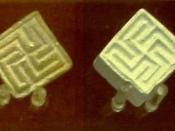Societal order has been a major problem throughout the ages. The need to maintain order has been a key issue in the early development of early civilizations. This is an extremely interesting topic to study due to the fact that all early civilizations had the same basic problems that needed to be addressed, however, the means that they employed to convert disorder into ordered civilization vary according to the people that are studied. The metamorphosis from chaos to social order had started from the very earliest grouping of man, but did not reach a level of sophistication until around 500 BCE in the Indus valley and china. Through the ancient literature, Confucian philosophy in China and Hinduism in the Indus valley, we can draw many conclusions about how their society functioned, which in turn can lead to interpretation of many other social values and customs.
Confucian though has influenced China for more than 2,000 years.
Since his disciples collected his wisdom and published it under the name of "The Analects", China has relied upon them as a moral compass and governmental aid. His highly secular philosophy is not directed for all of Chinese society, but is intended only for the educated and socially mobile middle class. Although, the servant and aristocratic class were later influenced by Confucian thought through governmental reliance upon his ideas.
Confucian philosophy can be seen as a logical progression from early china until the live of Confucius. His life was dominated by the constant chaos created by the age of warring kingdoms, that was around 500 BCE. Thus, his philosophies revolve around bringing order to his chaotic surroundings. To do this Confucius devised a highly secular set of relationships to ensure social order. The 5 relationships are the key to understanding Confucius and his text. His...


